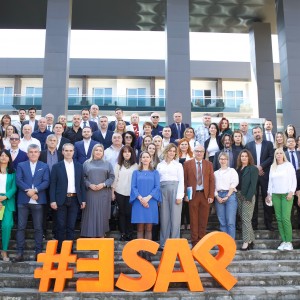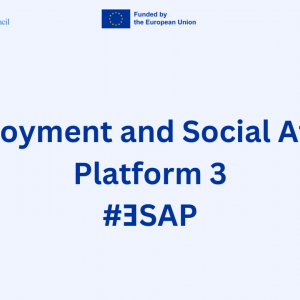INTERVIEW - EIB to back W. Balkans in speeding up digital transition

SOFIA (Bulgaria), November 4 (SeeNews) - The countries of the Western Balkans will need to speed up the digital transition towards a sustainable economy to integrate better into the EU market, an European Investment Bank (EIB) official told SeeNews.
"The EIB has agreed to finance the development of digital infrastructure in Serbia, and we are already discussing similar investments in Albania and Kosovo*. The implementation of some of these projects should be starting in the months to come," Matteo Rivellini, head of division in charge of lending operations for Slovenia, Croatia and the Western Balkans at the EIB, told SeeNews in a recent interview.
The green transition is another regional priority that will lead to more sustainable, resilient and inclusive economic growth in the region and the EIB is ready to provide full technical and financial support in terms of both loans and grants and support the transition to low-emission natural gas infrastructure as the first phase.
"This will serve as a basis for switching to a decarbonised gas energy supply in the years to come. Meanwhile, we have also started developing renewable energy projects in the region and the first loan will be signed very soon," Rivellini said.
INCLUSIVE GROWTH
In addition to digital and energy connectivity, the EIB will continue to invest in the modernisation of transport in the Western Balkans, in particular by supporting the construction of new motorways and the reconstruction of railways.
"Improving digital, energy and transport connectivity will result in the creation of a more competitive regional market with faster trade flows, better conditions for investors and increased and inclusive job opportunities for all. As such, it will be able to find its place within the EU market and new production and distribution chains relocated to neighbouring countries," Rivellini said.
The bank is also considering steps towards tackling the brain drain in the region, as there is a clear risk of the working-age population of the Western Balkans significantly shrinking between now and 2050, by up to a third in Bosnia and Herzegovina, the EIB official said.
"The EIB Group will continue to support the region to enable the economy, skills and jobs to grow alongside the much-needed reforms, particularly in the area of the rule of law, in an attempt to invert the trend from brain drain to brain gain and circulation."
The Western Balkans will need to continue reforming the public sector and supporting the full integration of the Western Balkans in the European Union, Rivellini said, adding that strengthening and reviving transportation, healthcare, education and judicial infrastructure is essential for economic resilience and growth.
"These initiatives should be accompanied by ongoing support for healthcare and the private sector to overcome the pandemic and prevent further economic fallout. At the same time, the region will need to undergo a digital and energy transition to ensure sustainable and inclusive development. All these efforts are expected to result in the creation of a more competitive regional market with improved socioeconomic conditions for the entire population."
TWO-TIER APPROACH
The EU and EIB are committed to supporting the Western Balkans and have taken concrete steps since the onset of the pandemic, adopting a two-tier approach to address immediate needs while also boosting long-term resilience.
"To address immediate needs we adopted a 1.7 billion euro ($2 billion) COVID-19 recovery package for the Western Balkans in May 2020, just weeks after the pandemic hit Europe. This package is a key component of the 3.3 billion euro EU response for the region and allowed the EIB to primarily support small and medium-sized enterprises (SMEs) and healthcare – the two sectors most affected by the pandemic. Our package unlocked much-needed and affordable financing that will enable them to address their most urgent needs," Rivellini said.
At the same time, the bank has stepped up efforts in key infrastructure to increase the resilience of local economies to future emergencies. It has increased its support for vital investment projects to avoid delays in their implementation due to the pandemic, including the modernisation of the healthcare sector, the rehabilitation of roads and railways, and upgrades to environmentally friendly water and wastewater infrastructure.
The EIB has provided more than 8 billion euro to finance investments in the Western Balkans over the last decade and aims to continue with its two-tier approach and provide financing and technical assistance to accelerate the preparation, funding and implementation of key infrastructure projects in the region, Rivellini pointed out.
"We look forward to doing even more for the region. The European Commission recently announced the Economic and Investment Plan, with a 9 billion euro financial package for the Western Balkans that includes a mix of financial and technical assistance. This is a considerable package, and as part of the family of EU institutions, we expect to take part in the implementation of some of the strategies defined in it."
SMEs AND MIDCAPS
The EIB has been providing support to the region for more than 40 years and will continue investing in the recovery of SMEs, which are the pillar of employment in the Western Balkans, and will also focus on increasing access to finance for the underbanked, including micro-companies and innovative and technological start-ups, Rivellini said.
He pointed out that the EIB Group, comprising the EIB and the European Investment Fund (EIF), has already signed six new credit lines for the region, including two guarantee agreements, in order to make sure SMEs active in the tourism, logistics, transportation, food, accommodation, and service industry sectors overcome the problems as they are considered most affected by the pandemic.
"These agreements support faster economic recovery and youth employment. We have helped SMEs and mid-caps retain jobs and liquidity, as well as the ability to undertake future investments, which will be key to the successful recovery of national economies. These European funds are now available for SMEs at favourable terms through our partner banks."
For example, in Serbia, together with the UniCredit Group, the EIB has created a new financial instrument to support companies making a long-term impact on society, signing the first-ever impact incentive loan in June 2020. The 30 million euro investment is the first EIB private sector loan under the Economic Resilience Initiative in the Western Balkans, created by the EIB to help the region cope with the migrant crisis, Rivellini noted. The innovation is in the system of financial rewards that companies receive upon meeting different social impact goals within a defined period.
"We have designed this credit line for socially responsible companies that are committed to hiring, training and providing long-term employment to people from underserved and vulnerable groups, such as young people, women and minorities. It actively supports communities and opens up job opportunities for vulnerable groups, promoting youth employment and female entrepreneurship."
The EIB official also noted the bank has stood by the people of the Western Balkans in times of economic crises and natural disasters, such as floods, earthquakes and now the pandemic, and will continue in the same direction when it comes to the COVID-19 recovery, as the crisis will require the joint efforts of all the EU institutions and partners in the region to achieve full socioeconomic recovery.
(News source: seenews.com)


